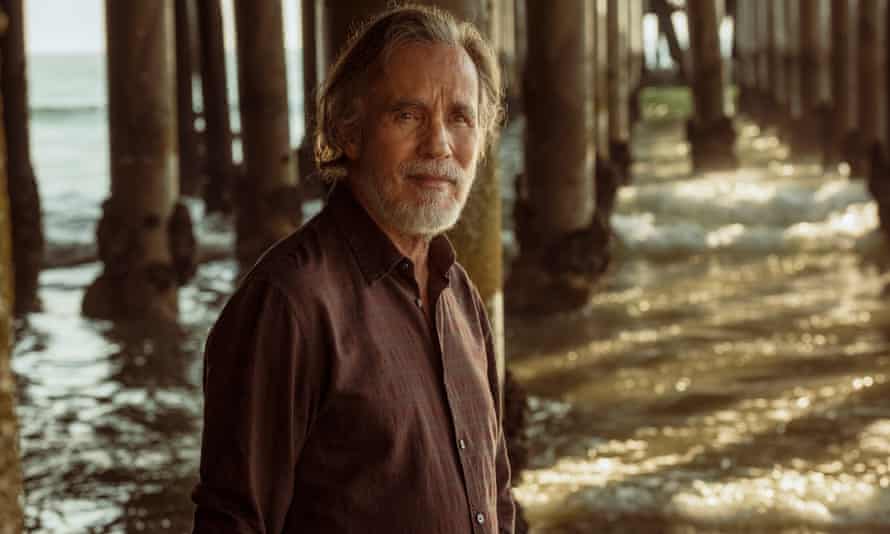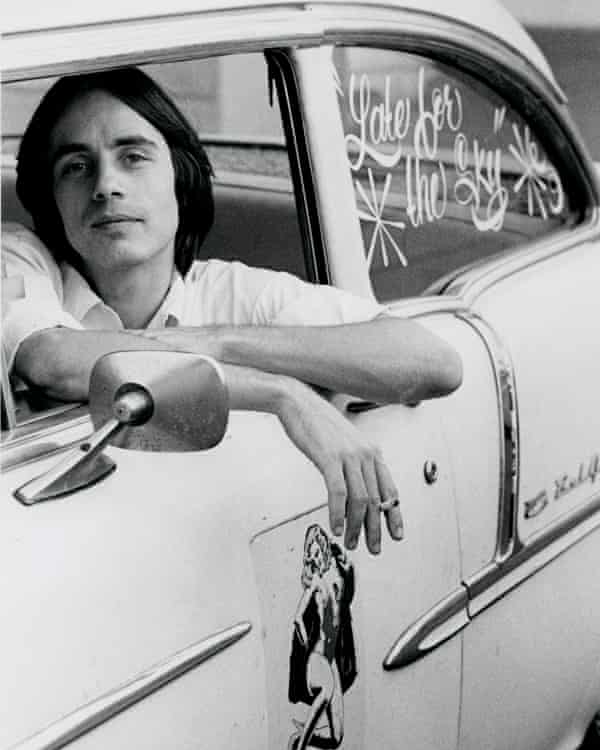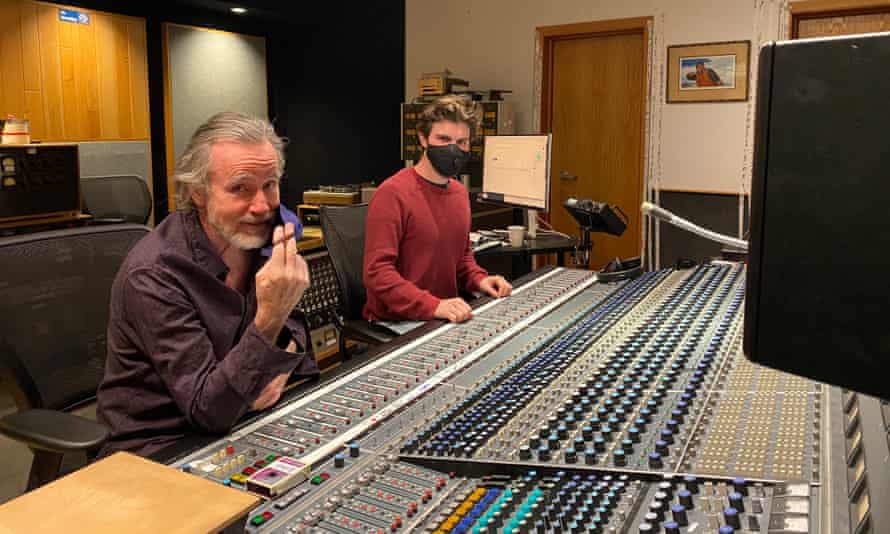Jackson Browne: ‘I think desire is the last domino to fall’
The singer-songwriter discusses his new album and how his age and the current political landscape has shifted his musical direction

Jackson Browne: ‘What’s more personal than your political belief?’
Photograph: Nels Israelson
Jim Farber
Tue 13 Jul 2021 06.36 BST
In the nearly seven years leading up to Jackson Browne’s new album, Downhill from Everywhere, he entered a new decade of life (his 70s), became a grandfather and saw fresh waves of activists, from the MeToo movement to Black Lives Matter, replace the ones that had inspired him in the 60s and 70s. At the same time, many of his new songs center on a theme most people associate with the bloom of youth: desire. “I think desire is the last domino to fall,” Browne said in a phone interview from his LA home. “Desire is eternal, like hope. It’s just your capacity to act on it that changes,” he added with a dark laugh.
It’s that capacity that Browne ponders and challenges throughout the album, from its restless opening track, Still Looking for Something, to its finale, Song for Barcelona, which presents that Spanish city’s vibrancy as its own avenue for renewal. With characteristic eloquence and reach, Browne addresses desire in all its forms, whether that be for a romantic connection, a sense of purpose, a political goal or simply to experience something new.
Despite the scope of his yearning, Browne kept his perspective tight by framing everything from a well-seasoned point of view. “I’m old, you know,” said the 72-year-old songwriter. “It’s one of the undeniable facts of this life that it doesn’t last forever. So, I think my questions now have more to do with, ‘what can be accomplished in the time I have left?’ And, ‘what are we here for in the first place?’”
Such philosophical questions have served as both a spur and a muse for Browne ever since he first garnered attention as a teenage poet prodigy in the late 60s, when he wrote such improbably heavy songs as These Days. Not that he finds the gravity of such songs unlikely. “Kids have a very intense emotional life,” he said. “They just don’t get credit for it.”
He believes some of his flair for capturing grave emotions comes from listening to a lot of older blues and folk musicians from a young age. “When you sing an old song, you take on that feeling,” he said. “Also, my mother had this great collection of blues lyrics that treated them like an anthology of poems. That stuff hit me like a thunderbolt. ‘Man, this is the stuff!’ I thought. It’s a distillation of the human spirit.”
The political side of older folk songs inspired him to become his own kind of musical activist. In that spirit, the new album continues Browne’s common pattern of balancing politically minded pieces with personal ones. Still, he pushes back against the assumption that there’s a clear separation between the two. “What’s more personal than your political belief?” he said. “It’s highly personal.”
At the same time, he’s well aware that many people find songs with a political message preachy and pedantic. For him, such criticisms go with the territory. “You try not to preach,” he said. “But the problem is, if you’re too oblique, no one knows what the hell you’re talking about.”
He believes the resistance by some listeners to political music comes from a kind of guilt. “They can feel like they’re being lectured to simply because they don’t know much about the subject,” he said. “And they get the feeling they should know more.”
He has experienced such awkwardness first-hand while performing political songs he has written like Lives in the Balance. “I could tell people were getting restless,” he said, “so, I said to the audience, ‘I can see that I’m making some of you uncomfortable, but I feel like maybe that’s what I should do.’”

Photograph: Library of Congress
For the new album, Browne wrote a song called Until Justice is Real, whose title echoes the rallying cry of the activist group Color of Change. Their stated mission is “to create a more human and less hostile world for Black people in America”. Another song on the album, The Dreamer, deals with the vexing issues surrounding Mexican immigration to the US. Such messages arrive at an opportune time. In the last few years, young people have become more politically involved than at any time since Browne was young. “For a long time, it didn’t seem like youth engaged in anything like this,” the songwriter said. “Maybe it’s that now the problems are so severe, they can’t be ignored.”
While the return to activism may stir Browne, the rise of Donald Trump, and what that has revealed, has shaken his deepest assumptions about both politics and human nature. “Like a lot of people, I fundamentally believed that we were on a gradual ascent towards solving the problems that we have had all along, having to do with inclusion and opportunity and justice,” he said. “I thought that things were getting better. Evidently, I was wrong. We can’t pretend any more than we don’t have the same divisions in this country that we’ve had since the civil war.”
Advertisement
But if Browne’s world view has darkened, his own life seems to be on the upswing. He says he’s now more excited about making music than he has been in years, buoyed by his band, who contributed more to the songwriting process than usual for the new album. More, the lyrics to several new songs, including Human Touch and Minutes to Downtown, capture a man who, late in life, has found a new romantic involvement. In the latter song, he sings, “I didn’t think I would ever feel this way again/no, not with a story this long and close to the end.”
Along the way, the song’s narrator offers a key detail, referring to “the years I’ve seen that fell between my birth date and yours”, clearly speaking to a younger lover. When asked about the lines, Browne takes a long pause. “I hate to disclose stuff about the personal part of the song because songs are about the listener,” he said. But, “in this case, I’m telling the truth about my own situation.”

For the new album, Browne wrote a song called Until Justice is Real, whose title echoes the rallying cry of the activist group Color of Change. Their stated mission is “to create a more human and less hostile world for Black people in America”. Another song on the album, The Dreamer, deals with the vexing issues surrounding Mexican immigration to the US. Such messages arrive at an opportune time. In the last few years, young people have become more politically involved than at any time since Browne was young. “For a long time, it didn’t seem like youth engaged in anything like this,” the songwriter said. “Maybe it’s that now the problems are so severe, they can’t be ignored.”
While the return to activism may stir Browne, the rise of Donald Trump, and what that has revealed, has shaken his deepest assumptions about both politics and human nature. “Like a lot of people, I fundamentally believed that we were on a gradual ascent towards solving the problems that we have had all along, having to do with inclusion and opportunity and justice,” he said. “I thought that things were getting better. Evidently, I was wrong. We can’t pretend any more than we don’t have the same divisions in this country that we’ve had since the civil war.”
Advertisement
But if Browne’s world view has darkened, his own life seems to be on the upswing. He says he’s now more excited about making music than he has been in years, buoyed by his band, who contributed more to the songwriting process than usual for the new album. More, the lyrics to several new songs, including Human Touch and Minutes to Downtown, capture a man who, late in life, has found a new romantic involvement. In the latter song, he sings, “I didn’t think I would ever feel this way again/no, not with a story this long and close to the end.”
Along the way, the song’s narrator offers a key detail, referring to “the years I’ve seen that fell between my birth date and yours”, clearly speaking to a younger lover. When asked about the lines, Browne takes a long pause. “I hate to disclose stuff about the personal part of the song because songs are about the listener,” he said. But, “in this case, I’m telling the truth about my own situation.”

Jackson Browne and Kevin Smith at Groove Masters. Photograph: Photo by Lori Fletcher
He wouldn’t be more specific but he stressed that, to him, “the more telling part of the lyric is the line about ‘a river changing course’. I actually looked it up and that can happen. Rivers do change course, but it’s a long process. I think my life has changed course. I’ve taken on a commitment to personal growth. And it’s late,” he added.
Browne deals with such late-breaking quests in a humorous way in the album’s single, Cleveland Heart, which finds him travelling to the famous Cleveland Clinic to have an artificial heart transplant. In the song, he says of that miraculous device, “they’re made to take a bashing / and never lose their passion. They never break and they don’t ache,” he sings. “They just plug in and shine.”
“It’s the whole idea of eliminating human frailty,” he said. “Wouldn’t that be great? Automatic happiness!”
In the video for the song – which features songwriter Phoebe Bridges playing a nurse – Browne once again underscores his age by letting his hair go grey. “I’m as vain as the next person,” he said. “But what are you going to do? To me, when I see an old guy with a dye job it interferes with my enjoyment of the person’s work. If you’re talking about what’s really going on in a life, you can’t be wearing a disguise.”
Browne’s sustained quest to be frank led him to close the album with Song for Barcelona, which imagines a life for him beyond music, made possible by a city he has long loved. “The song is about coming to terms with mortality and life’s temporal changes,” he said. Barcelona “is a place I could imagine myself going to live at some point. I would be like one of those little old people you encounter on the street – another person in the crowd.”
Downhill from Everywhere is released on 23 July
He wouldn’t be more specific but he stressed that, to him, “the more telling part of the lyric is the line about ‘a river changing course’. I actually looked it up and that can happen. Rivers do change course, but it’s a long process. I think my life has changed course. I’ve taken on a commitment to personal growth. And it’s late,” he added.
Browne deals with such late-breaking quests in a humorous way in the album’s single, Cleveland Heart, which finds him travelling to the famous Cleveland Clinic to have an artificial heart transplant. In the song, he says of that miraculous device, “they’re made to take a bashing / and never lose their passion. They never break and they don’t ache,” he sings. “They just plug in and shine.”
“It’s the whole idea of eliminating human frailty,” he said. “Wouldn’t that be great? Automatic happiness!”
In the video for the song – which features songwriter Phoebe Bridges playing a nurse – Browne once again underscores his age by letting his hair go grey. “I’m as vain as the next person,” he said. “But what are you going to do? To me, when I see an old guy with a dye job it interferes with my enjoyment of the person’s work. If you’re talking about what’s really going on in a life, you can’t be wearing a disguise.”
Browne’s sustained quest to be frank led him to close the album with Song for Barcelona, which imagines a life for him beyond music, made possible by a city he has long loved. “The song is about coming to terms with mortality and life’s temporal changes,” he said. Barcelona “is a place I could imagine myself going to live at some point. I would be like one of those little old people you encounter on the street – another person in the crowd.”
Downhill from Everywhere is released on 23 July
No comments:
Post a Comment